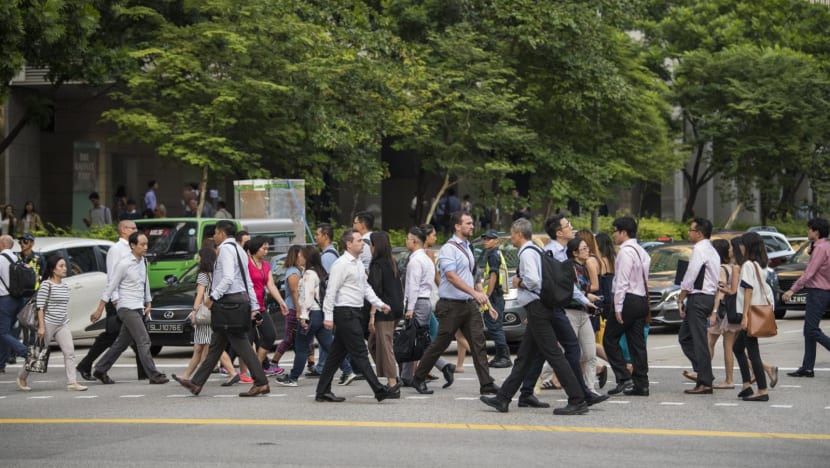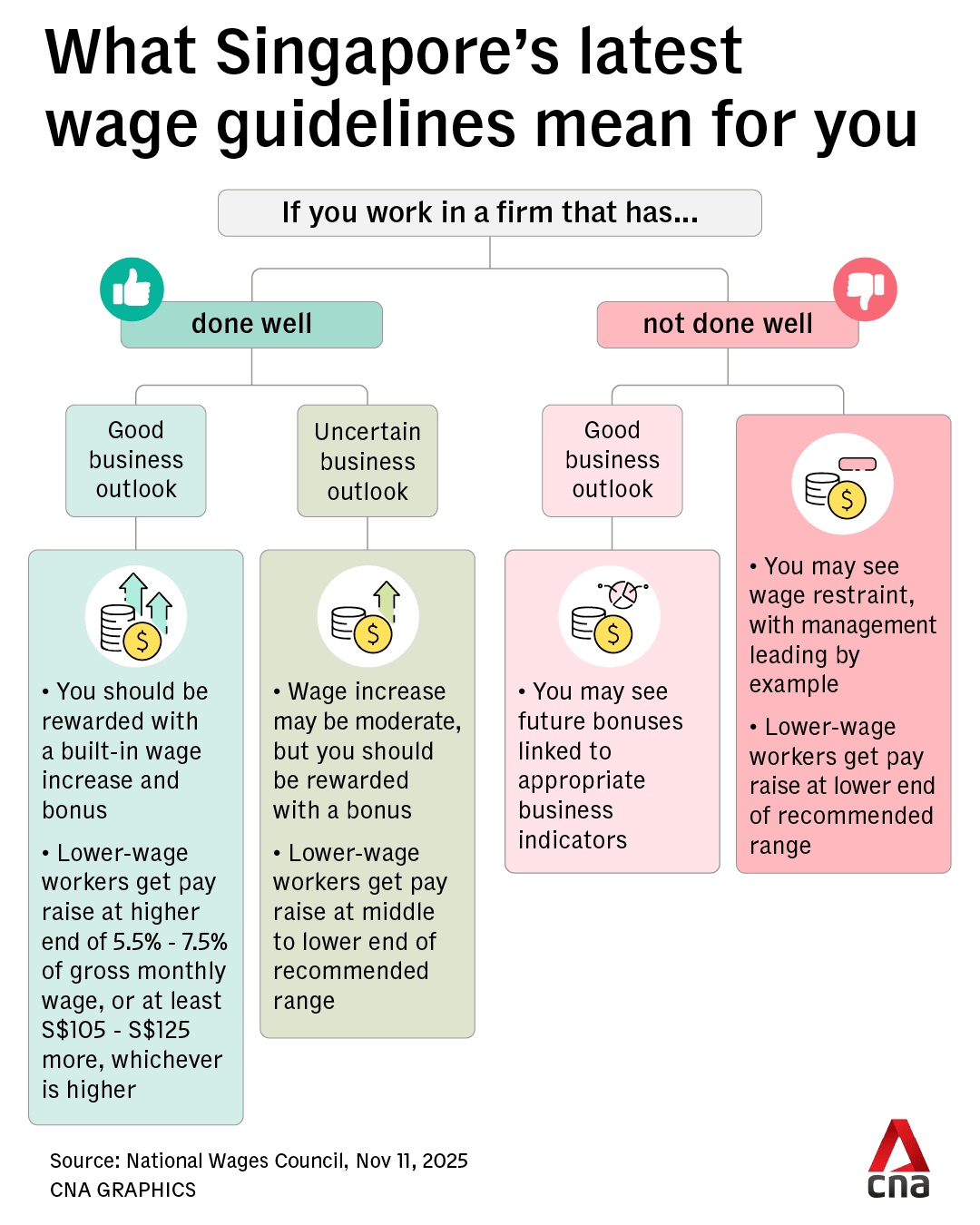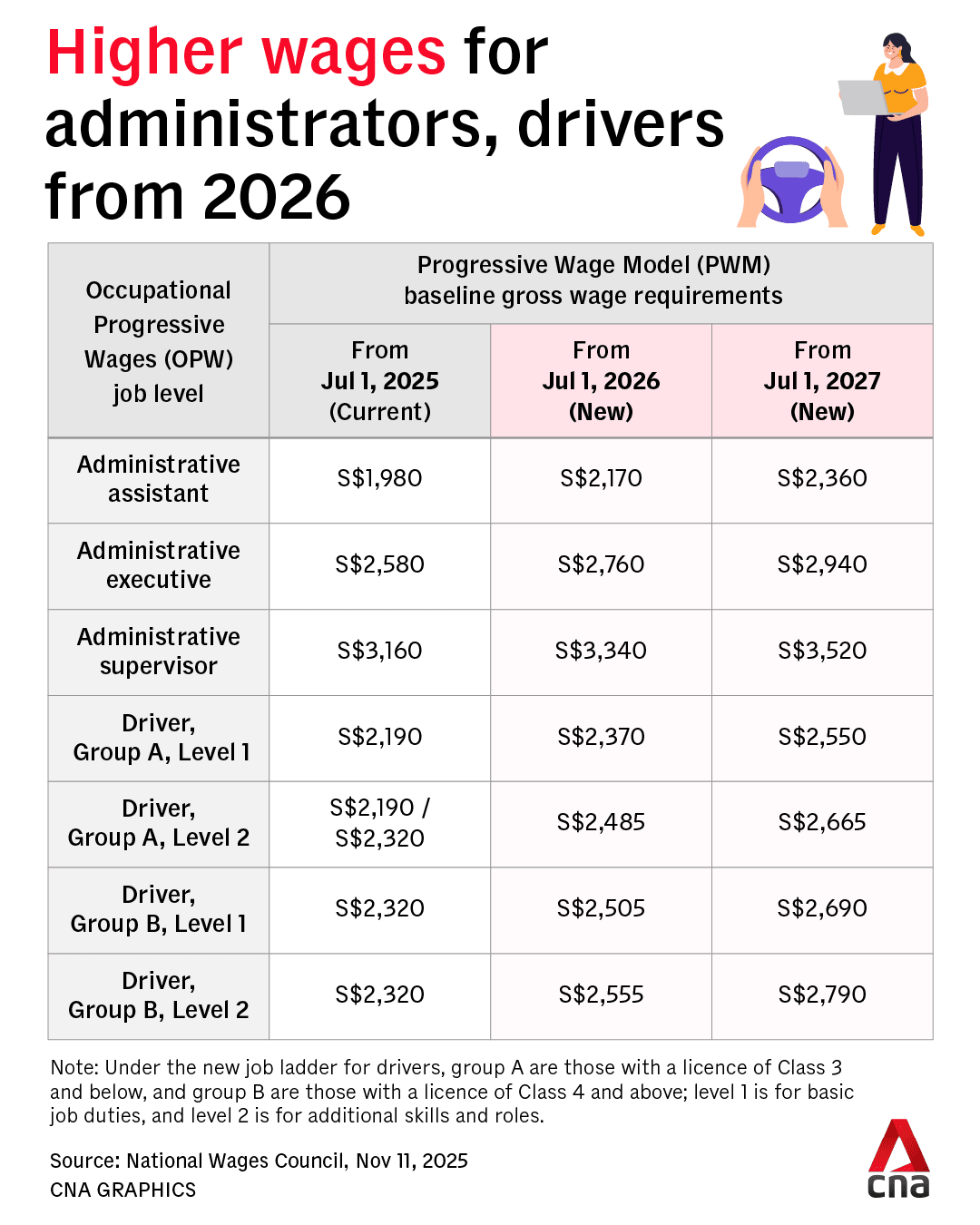Firms may limit wage hikes if prospects are dim, but should still pay bonuses if they did well: National Wages Council
The council also recommended bumping lower-wage workers' pay by 5.5 per cent to 7.5 per cent of their gross monthly wage, or at least S$105 to S$125, whichever is higher.

Office workers walking on the streets of the Central Business District. (File photo: iStock/3yephotography)

This audio is generated by an AI tool.
SINGAPORE: Amid uncertainties in the global economy and the cost pressures faced by businesses, employers who have done well but face uncertain business prospects may moderate built-in wage increases for workers, the National Wages Council (NWC) said on Tuesday (Nov 11).
However, they should still reward employees with variable payments like bonuses and one-off payments, the tripartite body said in its wage guidelines for December 2025 to November 2026.
Conversely, employers who have not done well may exercise wage restraint "with management leading by example", the council recommended. If business prospects appear positive, they should consider setting out future bonuses linked to "appropriate business indicators".
"Wage growth should be in line with productivity growth," said the council, adding that employers are encouraged to reward employees with wage increases that are "fair and sustainable" and to share the profits and gains from labour productivity improvements.
Unlike previous years, NWC's latest annual benchmarks aimed at guiding employers on pay increases took into account the global economic headwinds linked to tariff measures by US President Donald Trump's administration.
Mr Peter Seah, the NWC chairman, said at a press conference that the council discussed the potential downside risks posed by uncertainties in the global economy when formulating the latest guidelines.
The council noted that Singapore's GDP growth is projected to continue slowing for the rest of the year, with weak manufacturing growth ahead as the US tariffs affect demand in global markets.
Softening global trade is also expected to lead to modest growth for the wholesale trade sector and a slowdown in demand for shipping and air cargo services, putting a drag on the transportation and storage sector.
Consumer-facing sectors are expected to stay lacklustre partly due to a continued shift in locals spending more abroad, added the council.
The government has accepted the recommendations, said Ministry of Manpower (MOM) permanent secretary Ng Chee Khern. The new guidelines will take effect from Dec 1, 2025 to Nov 30, 2026.
Mr Ng, who is retiring on Dec 1 after serving 41 years in the public service, also highlighted the guidelines by the council to uplift wages for lower-income workers.
"We agree that the wage guidelines must allow for meaningful increments for workers, and at the same time, be sustainable for businesses," he said.

FLEXIBLE WAGES TO CUT COSTS AND NOT JOBS
In its statement, the NWC said there is a need for wage flexibility in light of the economic uncertainties.
The council called on all employers who have not done so to implement the flexible wage system in full. Under the system, employees receive an annual variable component and monthly variable component.
In adverse conditions, this system enables employers to sustain their businesses by cutting costs rather than jobs. During an upturn, the system also allows for a quick adjustment of wages to retain talent, said the council.
Singapore National Employers Federation (SNEF) president Tan Hee Teck said that given cost pressures and higher margins, wage flexibility is no longer just "good to have", but essential.
Firms that have fully implemented the flexible wage system, with both monthly and annual variable components, remained largely stable at 8.5 per cent in 2024.
This was lower than the 76 per cent of firms that have implemented either a monthly or annual variable component, according to MOM.
NWC also noted Singapore's rapidly ageing workforce and diversifying work patterns. The proportion of seniors in the labour force aged 60 years and above rose from 12.3 per cent in 2014 to 18.9 per cent in 2024.
To support longer careers and accommodate more flexible work arrangements, the council is "exploring ways to better reflect skills, contributions and varying workloads, and make the guidelines more fit-for-purpose for our future workforce".
The review comes after the establishment of a Tripartite Workgroup on Senior Employment this year.
Mr Ng, the MOM permanent secretary, said the initiatives that come out of this study of senior workers could apply to other segments of the workforce like caregivers.
Flexible work arrangements will give firms the ability to bring more workers into the labour force, said Mr Ng, who noted that Singapore's labour market remains very tight.
Asked if employers associate flexible work arrangements with being able to pay employees less, he disagreed.
"Singapore has just about the highest (proportion of) full-time rather than part-time workers in the more developed countries. So I'm not so worried that employers will fractionalise jobs or pay (for) part-time work just to save costs," he said.
NWC aims to complete this review by 2026.
UPLIFTING LOWER-WAGE WORKERS
Similar to last year's guidelines, NWC recommended a 5.5 to 7.5 per cent increase in gross monthly income, or an increase of at least S$105 to S$125, whichever is higher, for lower-wage workers earning a gross monthly wage of up to S$2,700.
The council also recommended updates to occupational progressive wages for those working as administrators and drivers, which were last updated in October 2023.
NWC recommended pay increases from 2026 to 2027 and new job ladders for these occupations. These will apply to a total of about 57,600 lower-wage workers who are full-time administrators and drivers.
About 53,200 or 92.4 per cent of these lower-wage administrators and drivers were earning less than the new 2026 wage requirements in 2024.
The guidelines targeted at lower-wage workers are intended to narrow the pay gap with median wage workers.
Around 26.2 per cent of firms raised lower-wage workers' pay by the council's recommended amount in 2024, said MOM. In addition, 60 per cent of firms gave pay raises of any amount to lower-wage workers.

The business cost of these pay increases for lower-wage workers are offset by government co-funding through the Progressive Wage Credit Scheme (PWCS). This was enhanced in Budget 2025, with government co-funding levels raised to 40 per cent and 20 per cent for 2025 and 2026.
The co-funding applies to workers whose average gross monthly income was S$3,000 and under before the wage increase, and up to S$4,000 after the increase.
They must receive an average gross monthly pay increase of at least S$100 for the firm to be eligible for PWCS.
NWC also called on employers to step up job transformation efforts and invest in raising employees' skills, after noting declining participation in this area.
From 2023 to 2024, the proportion of employers who provided structured training to employees fell from 79.6 per cent to 66.4 per cent, while the proportion of employees receiving structured training fell from 54.3 per cent to 52.6 per cent.
This was according to an MOM survey on employer-supported training in private sector firms.
SNEF vice-president Kuah Boon Wee said the decline was mainly seen in the wholesale and retail trade, as well as community, social and personal services sectors.
Many firms in these sectors feel that their employees are adequately skilled and that it is better for them to receive informal, on-the-job training, he said.
EMPLOYERS AND UNIONS SUPPORT GUIDELINES
The SNEF reaffirmed its strong support for NWC's guidelines, including the alignment of wage growth with productivity gains.
"This alignment ensures that businesses remain competitive to deliver long-term growth that ultimately benefits workers," it said.
SNEF also said it appreciates that NWC's guidelines for lower-wage workers considering the uncertain economic outlook ahead.
The guidelines apply to all employees in unionised and non-unionised firms, in both public and private sectors, and also includes those working full-time or part-time, the council said.
Platform workers are also included in the guidelines for the first time, said National Trades Union Congress (NTUC) president K Thanaletchimi.
She noted that platform workers may benefit from some of NWC's recommendations, such as in training and career planning, and that these are subject to discussion with platform work operators and associations.
In a separate statement, NTUC said it welcomed the inclusion of platform workers in the guidelines, adding that this was an important step towards recognising and uplifting the wages of this group of workers.















